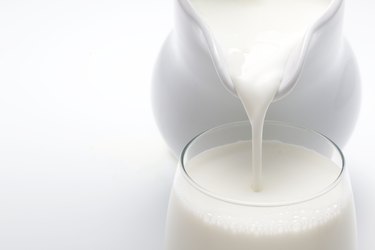
Does milk make you gain weight?
Milk can hinder your weight loss goals if consumed in fat form. However, it contains important nutrients that make it a beneficial addition to your diet. Learn how milk causes weight gain.
Growing up, we had to drink at least one glass of milk every day. We have always known that it provides the calcium we need to strengthen our bones. Milk contains protein and many essential nutrients and vitamins. But have you ever thought that these benefits come at a cost? Many people don’t drink milk because they think it will make them gain weight. Well, let’s burst the bubble for you. Dairy can help you lose weight when consumed in moderation, but it can also cause you to gain weight with just one mistake. Learn how dairy can cause weight gain and how you can reduce your risk.

Is Milk Bad for Weight Loss?
If you are trying to lose weight, you should consider milk as a part of your plan. Drinking your milk in moderation will help you manage your weight long-term. However, you should be aware of the calories, carbs, and unhealthy fats in milk and other dairy products. According to the Journal of Nutrition, most children and half of adults in the United States drink milk regularly. Therefore, it allows for the addition of milk to your diet. However, drinking too much milk can lead to high calorie intake and weight gain.
If you want to cut calories, you can switch from whole milk to skim milk to support your weight loss plan. As part of a weight loss plan, you need to carefully monitor your carbohydrate intake. When choosing milk, keep in mind that a glass of milk contains about 11 to 12 grams of carbohydrates, regardless of fat content.
When it comes to milk and dairy products, things get even more complicated when you come across different types, such as full-fat, fat-free, low-fat, and nonfat (fat-free).
The calorie content of 1 cup of milk varies. Here’s the calorie breakdown for each type of milk:
- Whole fat: 146 calories
- Reduced fat: 122 calories
- Low-fat: 102 calories
- Nonfat: 86 calories
A 2019 report published in the Journal of Nutritional Sciences found that consuming high-fat foods is not associated with weight gain. Conversely, consuming dairy products may also help you build muscle and lose body fat, especially if you choose dairy instead of foods high in carbs.
So when is milk bad for you?
If you are lactose intolerant or allergic to dairy products, you may want to learn about the benefits of milk, another source of calcium and protein.
Fat in milk does not make you gain weight. When it comes to milk, you may want to consider the type of fat you consume. Milk contains less fat than butter. Milk contains saturated fat, the “bad” fat that causes obesity problems. It all depends on the type of milk you choose. A glass of whole milk contains about 4.5 grams of saturated fat, while a glass of skim milk contains less than 0.3 grams of saturated fat.
A glass of milk contains about 12 grams of cholesterol, which can lead to higher cholesterol levels. Milk can also help control belly fat. According to Health Journal, skim milk can help reduce belly fat, while whole milk has the same benefits.
Is milk good for you?
When we think of milk, we always know that it provides us with enough calcium, an important element for bones and muscles. Milk and yogurt are some of the foods richest in calcium. One glass of milk contains about 8 grams of protein, regardless of fat content. This can help improve your strength training and daily physical activity.
Milk is best for:
- Vitamin B2
- Vitamin B12
- Potassium
- Phosphorus
- Milk also increases vitamins A and D.
A 2016 study published in the Journal of Nutrition and Science found that regular consumption of dairy products may reduce the risk of heart disease and certain cancers, including breast, bladder and prostate cancer. Milk and other dairy products have also been linked to a lower risk of type 2 diabetes.
However, a 2021 study published in the Annals of Pediatric Endocrinology & Metabolism suggests that only low-fat dairy products, yogurt, and cheese may be effective in preventing type 2 diabetes mellitus.
Who should drink milk to gain weight?
If you’re trying to gain weight or build muscle, milk is an important addition to your diet, especially for:
- Athletes and bodybuilders – Milk is ideal for muscle growth and development because it contains protein and fat.
- If you’re underweight – People who want to gain weight in a healthy way can benefit from the nutrients and calories in milk.
- Growing Children and Teens – Milk supports healthy bones and structure, making it an important nutrient for growing people.
Who should not drink milk for weight control?
While milk is good for some people, it may not be suitable for everyone, especially those who are controlling their weight:
- People trying to lose weight – Whole milk is high in calories and regular consumption can hinder weight loss. It is a better option to choose low-fat or skim milk.
- People with Lactose Intolerance – People with lactose intolerance should avoid milk and find something else that does not contain lactose to prevent digestive problems.
- People with special dietary goals – If you are on a low-carb or low-fat diet, whole milk may not meet your dietary goals.
Milk Consumption by Age
When it comes to children’s obesity in the United States, many parents blame milk. But a 2019 study published in the Journal of Nutritional Sciences suggests that milk is not the culprit. For example, children who drink milk regularly are more likely to have slimmer bodies, smaller waists, and lower body fat than those who don’t drink milk.
Fat-free and skim milk is also a good and inexpensive source of calcium, protein, and other important nutrients and vitamins for older adults who may not be getting many important things from their diets.
A 2021 study published in the Journal of Health suggests that adults should drink milk because regular milk consumption may protect them more from diseases such as osteoporosis at this age. Fat-free milk is also helpful in controlling blood pressure because it is low in fat and high in protein.
Also, since lactose intolerance is more common in adults, lactose-free products and fermented products such as yogurt and kefir may be better choices.

Takeaway!
Milk can cause weight gain, especially when consumed with fatty foods. While it may be ideal for those looking to add extra calories, build muscle, or gain weight, it may not be suitable for those looking to lose weight or those who are lactose intolerant. Adjusting the type and amount of dairy in your diet can help you manage your weight.
